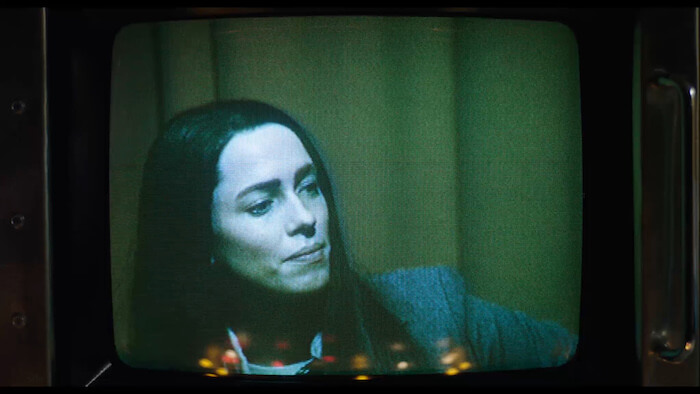If It Bleeds, It Leads: Christine

Christine
Directed by Antonio Campos
Opens October 14
In 1974, a 29-year-old Sarasota talk-show host named Christine Chubbuck shot herself on live television after reading a pointed statement about her station’s recent selling out to sensationalism. Notwithstanding the likely coincidental parallels in 1976’s Network—whose laid-off, “mad as hell” anchor Howard Beale vows to off himself on-air—it’s taken almost four decades for this woman’s sad legacy to seem ripe for on-screen investigation. And 2016 has brought not one but two of them. The 40-year-old Robert Greene’s Kate Plays Christine, a coy quasi-doc in which the actress Kate Lyn Sheil struggles to prepare for the role of Christine Chubbuck, came out in August. The 33-year-old Antonio Campos’s Christine, a more conventionally fleshed-out biopic headlined by Rebecca Hall, now follows.
Whereas Greene stressed his historical subject’s essential inaccessibility, following Sheil on a hunt for definitely-not-on-YouTube primary footage and other elusive traces of the real-life Chubbuck, Campos and screenwriter Craig Shilowich have crafted a sturdy on-the-job psychodrama. To emphasize the fatalist collegiality at the ratings-challenged WXLT, the filmmakers have taken the liberty (among several others) of making Christine a field-reporter fixture on the evening-news broadcasts rather than just the host of a stand-alone show. This is an organization scrambling to adapt to the times, completing the changeover from film to video while also giving up on good journalism in favor of a new mantra: “If it bleeds it leads.” Under pressure from beleaguered boss Michael (the Pulitzer Prize–winning playwright Tracy Letts), the thorough, principled, and somewhat plodding Christine struggles to keep up with the new blood-and-guts mandate.
In the apartment where she lives with her mother (J. Smith Cameron), Christine stays up listening to a police scanner behind the closed door of her bedroom, scouring for a potential story—even in such scenes of sitting and waiting, Hall, channeling her character’s desperation through the tensing of a distinctively lank posture, demands the viewer’s full attention. Christine often finds herself working well into the night, but there are also bigger-picture problems on the home front. Diagnosed with an ovarian cyst she’s told could complicate any future efforts to conceive, Christine nonetheless seems to be her own worst enemy when it comes to settling down—another front on which she feels she’s failed to progress. Not unlike the male sociopath at the center of Campos’s impressive previous film, the elliptically analytical Simon Killer, she exhibits some arrested-development intimacy issues, harboring an unrequited schoolgirl crush on cheeseball anchor George (a standout Michael C. Hall) and lashing out at her mother after she brings home a new boyfriend.
Campos, who more than a decade ago formed the production company Borderline Films with Sean Durkin (the man behind Martha Marcy May Marlene) and Josh Mond (the writer-director of last year’s James White), displays a minimum of period nostalgia in re-creating a clammy and drab 1974. A filmmaker with a rather jagged-edge sensibility, Campos nonetheless doesn’t lack for sympathy either. The proceedings come to a close with a quiet stunner of an outro, one that offers a new perspective—saner if still sad—on careerist compromise in an unforgiving industry. But it is Hall who is the real story here. It’s a showy yet well-wrought performance: She tops off her manic psychological portrait with a nearly flawless Ohio accent and a credible regime of nervous gestures. Hall’s work is all the more impressive given that Kate Plays Christine, with its focus on creative dead ends and its forthright discussion of exploitation, seemed to pronounce playing this particular real-life figure to be a near-impossible, not to mention somewhat unseemly, task. Christine is no masterpiece, but by and large it does justice to its subject, who falls victim to a toxic cocktail of major depression, social maladjustment, and the indignities of the emergent infotainment business. For all those interrelated themes, though, the film rarely feels overextended—it possesses the poise of the best on-air talent.
You might also like 



















